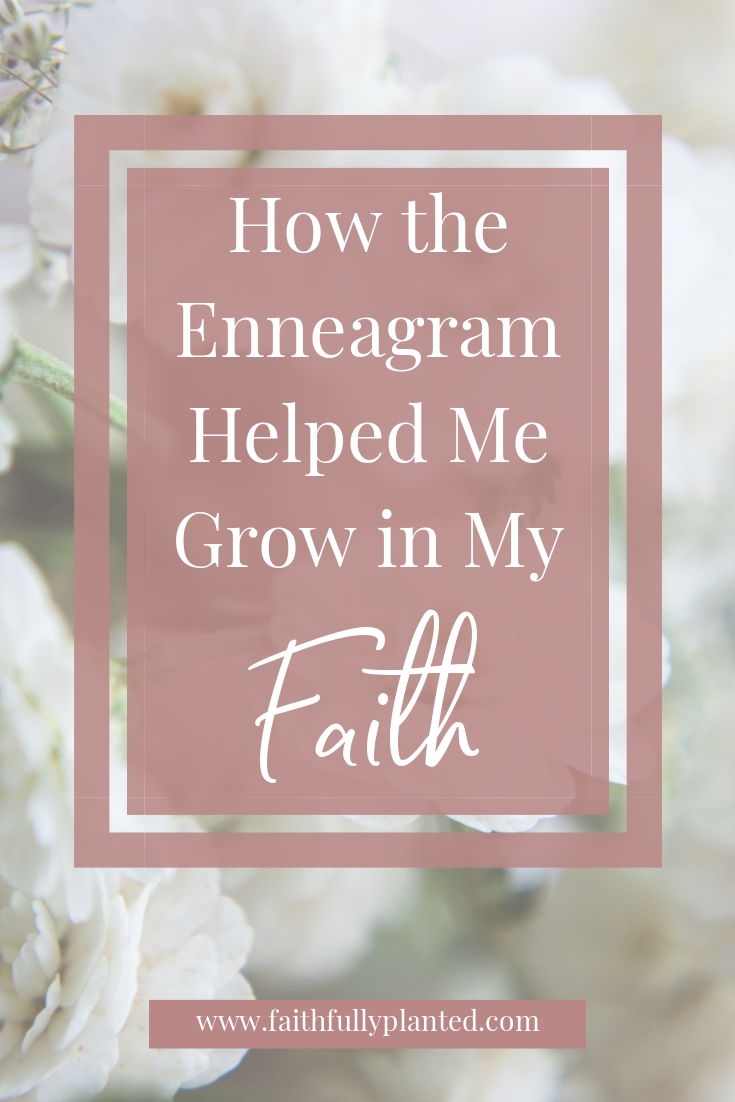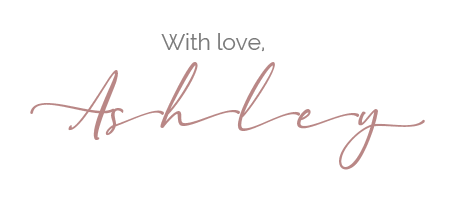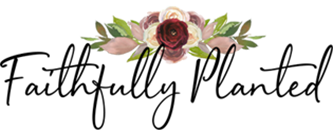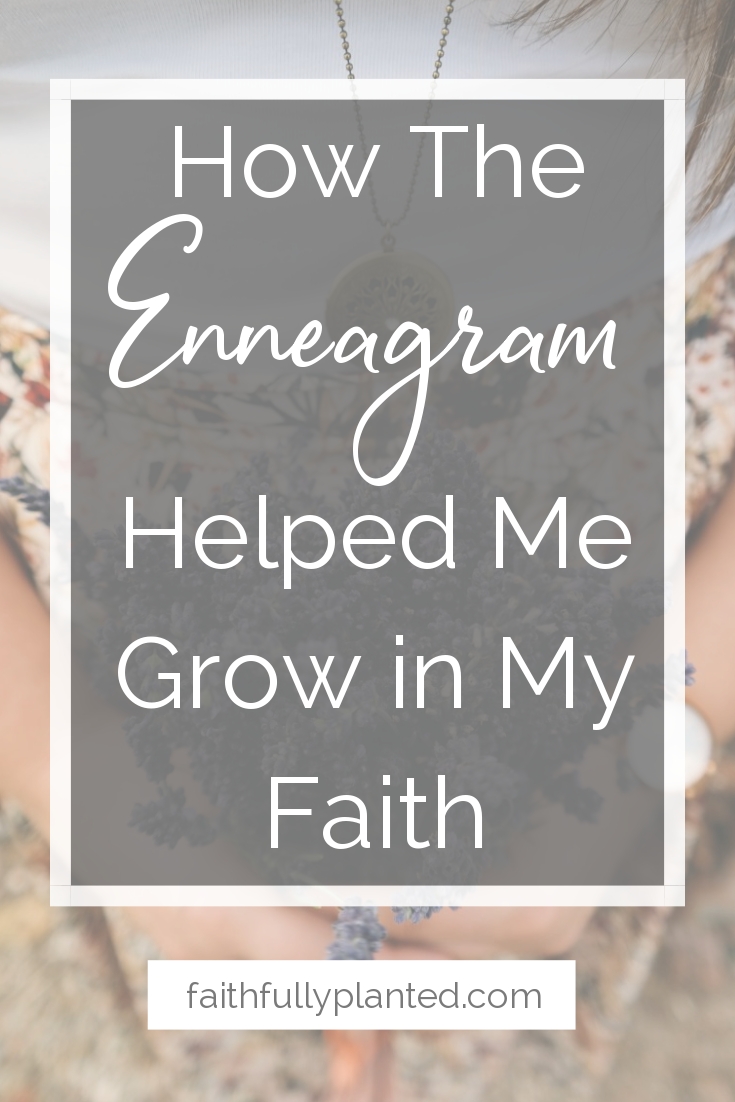How the Enneagram Helped Me Grow in My Faith

This post contains some affiliate links. If you make a purchase using my link, I may receive a small commission. I only recommend companies and products that I love and trust. This keeps the coffee brewing and the words flowing, so thank you for supporting Faithfully Planted!
Note: this post has been updated to my correct Enneagram number. I originally mistyped myself, which is very common to do. After continuing to deeply reflect on my deepest fears and desires, I realized my true type. I encourage each of you to use any test or initial typing as a starting point and to not get stuck on any one type. Keep your mind open and keep digging.
What is the Enneagram?
The Enneagram is a centuries-old personality framework. Some would say it’s a personality test, but that would be inaccurate. There are certainly tests that can help point you in the right direction, but no test is truly “the” Enneagram test.
The reason for this is that the Enneagram holds that most people don’t really know who they are or what makes them tick. We all lie to ourselves regularly about who we really are-even the most self-aware people still fall into this trap, so tests are not accurate. How can a test tell us what we don’t know?
It asserts that there are 9 basic personality types in the world and they all interact and relate to one another. Each person will likely have pieces and attributes from all of the types, but there is one type that will stand out from the rest. This is your basic personality type.
This is my favorite thing about the Enneagram: to truly understand your own personality type, you also have to know other types. You can best understand yourself when you take the time to understand the framework as a whole. I love how this requires us to seek who we are outside of ourselves.
Most personality type tests and frameworks are incredibly self-focused. And it makes sense, you’re curious about your own personality. But the Enneagram’s framework is different. It is complex, just as humans are complex and to fully understand it takes more time and dedication than taking a test and reading a description.
The Enneagram is a tool for growth, but it is not Scripture. It is not inherently “Christian” or Biblical. It is simply a tool you can use to grow in your faith if you choose to do the work and invite God into the process.

The 9 Types
- Type 1: The Perfectionist
- Type 2: The Helper
- Type 3: The Achiever
- Type 4: The Individualist
- Type 5: The Investigator
- Type 6: The Loyalist
- Type 7: The Enthusiast
- Type 8: The Challenger
- Type 9: The Peacemaker
Each type has basic, core characteristics including fears, motives, and expressions of its traits. Each also has something called “wings” or major connections to another type. These are denoted like this: 9w1 or 7w8.
There are two knowledge camps on wings. Some say you are entirely either one wing or the other; others hold that you have attributes of both wings, but you mean lean toward one or the other and those attributes are more dominant. Based on my limited knowledge of the Enneagram, I believe it is the latter.
Each type ask for love in a different way and has different ways of expressing that need to others. The Enneagram also helps you understand why you act differently when you’re really stressed, frustrated or feeling unloved. And also, why you have different facets come out when you’re feeling healthy and safe and loved.
At our core, all of us just want to be loved and accepted. The Enneagram helps you understand how that manifests in your life and how you compensate for feeling unloved.
How to Figure Out Your Type
There are a lot of ways to go about exploring the types and figuring out which one is your dominant personality. Many of you will be tempted to take a test and go with the first answer.
Finding out your type is a longer process than that. Tests can be a good starting point and if you’re looking for one, I recommend this one.
I, and many other Enneagram enthusiasts recommend reading about all of the types and really taking note of which resonates with you the most. Read through all of the types before making a decision. Since each type has a direction of integration and disintegration that moves towards another type, you need to have an understanding of each type.
A wonderful free resource for reading and learning about the Enneagram is TheEnneagramInstitute.Com. If you want to do even more reading and learn about it from a Christ-centered perspective, I highly recommend The Road Back to You by Ian Morgan Cron and Suzane Stable.

So, how Did Finding My Type Help My Spiritual Growth?
The Enneagram Pointed Out My Weaknesses
Sharing your type with people who really understand the Enneagram is like putting all your deepest fears and ugly motivations out for the world to see. When you discover your type, it is usually because reading about it made you uncomfortable, but in an accurate way.
People don’t generally enjoy criticism and that is a big part of what the Enneagram is-it points out your growth areas so that you can become a healthier, more Christ-like version of yourself. But, it also can be hard to hear.
So, I’ll explain with an example: me.
I’m a Type 7 on the Enneagram, the Enthusiast. Sevens are the most positive, optimistic, curious, friendly, adventurous and fun-loving number on the Enneagram. They are the first to find the silver lining and also the first to randomly hop on a plane to, well, anywhere.
They generate ideas constantly and their minds are always churning. They are quick-witted and fast-learners. They value variety and freedom and bring joy and laughter to those around them.
They tend to look at the world with child-like wonder, anticipating all the possible wonderful experiences this life has to offer and they awaken this in others.
However, they can also be flighty, shallow, flaky, scattered and scared of commitment. They fill their calendars from morning til night with activity after activity. But this stems from their deepest fear, which is to be alone with their emotions and thoughts and feel the negative parts of life, such as anxiety, depression, monotony, pain or grief.
When I first read about Sevens, I thought it sounded awful. I was like, “that is absolutely not me.” (hint: if you have an adverse reaction while reading about a type, that’s a good indicator that you may either be that type or have a wing of that type).
I thought I was more serious and reliable and deeper than that. It turns out I was wrong. As I reflected back on my life, I could see where I struggled to do one thing for very long. I’ve had a slew of different jobs and started multiple graduate degrees and left multiple professions.
I can now see how my life has been scattered and adventurous, but also without margin or healing. I can see the way I’ve overloaded my calendar with enjoyable activities to avoid dealing with my deeper emotions and childhood trauma.
Learning all of this about myself shined a spotlight on my opportunities for growth. It illuminated the areas of my life that I hadn’t surrendered to God. It showed me the scars on my heart I hadn’t allowed Him to heal.
The biggest thing I learned about myself was my tendency to overindulge in order to escape negative feelings or experiences. Every Enneagram type has a vice and gluttony is the vice of the type 7. Overeating, overspending, overcommitting and overdoing are all things type 7s will do in order to maintain positive feelings and experiences. They will drown their sorrows in a shopping spree or an ice cream binge at the drop of a hat, if unhealthy and ungrounded.
For example, I used to have a major shopping problem. Not so much that I would spend my rent money, but every spare dollar went to a Target or mall run. I genuinely believed those new shoes would make me happier. But that’s the problem with an unaware type 7-they will always believe they need more to be happy.
Learning this about myself was hard. But it helped me to recognize this pattern and figure out how to break it. It helped me realize that “being still” and decluttering both my life and my calendar were critical to my spiritual growth.
It helped me see my strengths, weaknesses, and tendencies and helped me to become more in tune with myself instead of hiding or burying my innermost fears with cheesecake and cute new sweaters and girls weekends.
When we truly know ourselves, we can know our limiting beliefs, our weaknesses, and our temptations and we can work to become stronger before they overtake us. When we see how God truly created us, we can enter a deeper relationship with Him and work to become more like Him.
RELATED: How The Enneagram Improved My Marriage
The Enneagram Helped Me Understand Myself Better
One of the common desires we all have is to feel known, seen and understood.
When I read about my type, I felt like the person writing knew me on a deep level, even with the not-so-pretty stuff about my personality. It was like looking into a mirror that I didn’t know was there.
As I was reading about Type 7s as children, in relationships and in workplaces it all resonated and revealed the reasoning behind a lot of my behavior.
I understood why I was so tired all of the time and why I never lasted long with any one idea; I understood why I ran to the mall instead of solitude with Jesus.
I understood why saying “no” even when I really wanted to was so hard. It helped me understand how I was made so that I could cultivate my strengths and prune my weaknesses, letting Christ work in my heart to be truly grounded and still.
The Enneagram Helped Me to Understand Others Better
The Enneagram as a whole helped me understand that we all crave love and acceptance. Those of us who have Jesus have that already and yet we still struggle with truly believing it. How much more does someone who doesn’t know Christ struggle with this?
It gave me a new lens through which to view humanity. Most of the difficulty people in your life are just desperate for love, relationship, and acceptance and are acting out trying to get it.
When I got a hold of this, it made the rudeness from the bank teller or the entitlement of student I was advising easier to handle. If someone is choosing to treat me poorly, it is almost always about them and not me. It is likely they are not self-aware and are bogged down by their own baggage.
There is a reason that one event could affect one person so deeply and not leave a trace of trauma on another.
The Enneagram Helped Me Learn To Care For Myself
Enneagram 7s struggle to be still and to rest.
Learning about my type helped me give myself permission to say no to things that God does not have for me.
I learned to filter my “yes” so that it was my best yes and not just an impulse. I made resting and margin a priority in my life and it has made room for me to pursue the things that truly matter to me, not just every “good” experience hoping to fill a void.
When I let myself say “no” to just good experiences, there is room for me to say “yes” to the great things God has for me in this life.
The Enneagram Gave Me A Road Map For Growing In Christ
A lot of times, we don’t make progress on things in life because we don’t know where to start.
Learning about my type gave me a place to begin with growing in my faith. Based on my type, I knew I needed to work on resting and saying no and sitting in stillness. I needed to work on selflessness and surrendering to God. I needed to learn to name my feelings and deal with my pain rather than drowning it out or ignoring it.
So, that’s what I did. I started with those things and began taking a deep look at my motives and my calendar. I forced myself to slow down and think through decisions and uncover what truly mattered to me. I began recognizing the urge to run from emotion or negative experience and gave myself permission to just feel and be in the present moment. I learned to say no to every invitation so there was actually margin and white space in my calendar.
What I really needed to learn that I was loved and accepted by Christ and that He was going to take care of me. I needed to learn to trust that He would meet my needs and that happiness and joy are not dependent on my experiences. This is a lesson I am still in the process of learning. But, I’m making progress.
I’m sharing my trials, errors, and experiences with you so that you might be able to get growing a little faster and easier than I did. Self-reflection is a difficult but worthy endeavor. We cannot grow in areas we don’t know about. We cannot allow God to work in parts of our hearts that are hidden from us.
In order to make progress in our growth, we first have to take care of the weeds.
So, are you ready to learn about your type and get growing in your faith? Grab The Road Back to You book! It’s an amazing read.










